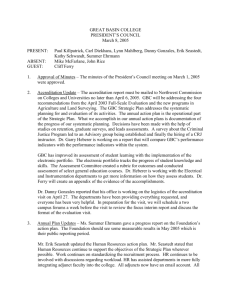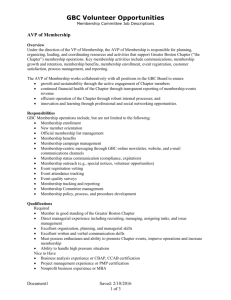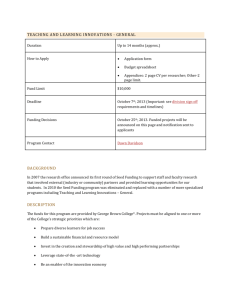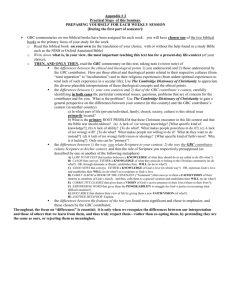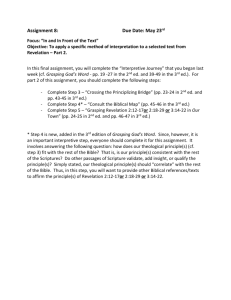Appendix # 2 Practical Steps of this Seminar,
advertisement
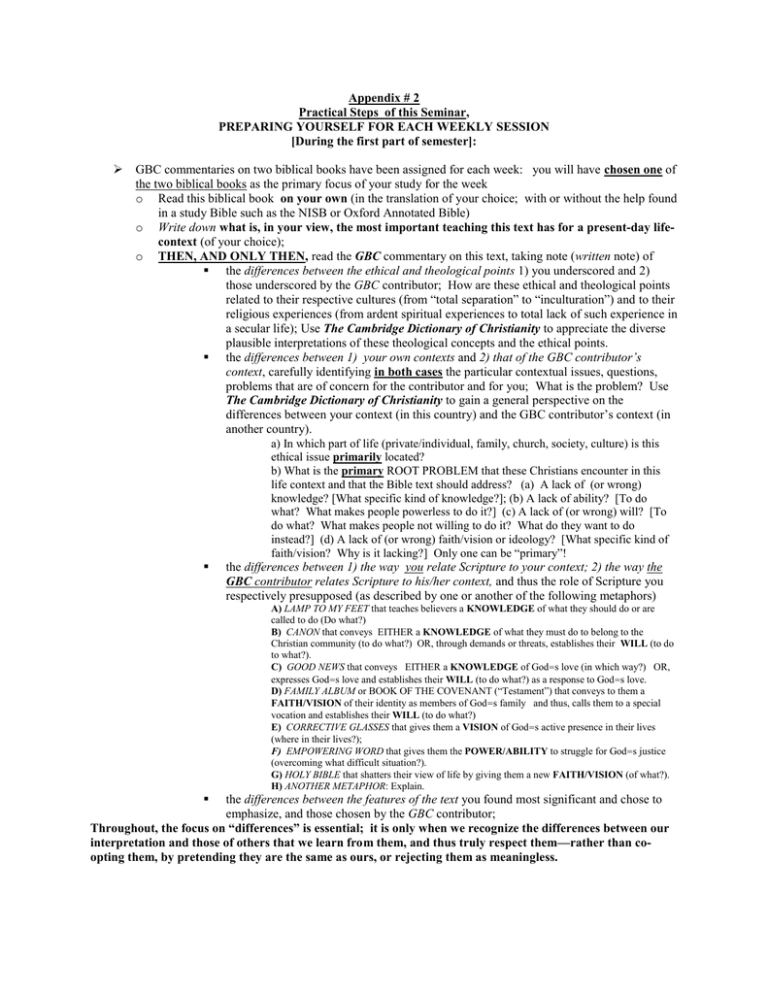
Appendix # 2 Practical Steps of this Seminar, PREPARING YOURSELF FOR EACH WEEKLY SESSION [During the first part of semester]: GBC commentaries on two biblical books have been assigned for each week: you will have chosen one of the two biblical books as the primary focus of your study for the week o Read this biblical book on your own (in the translation of your choice; with or without the help found in a study Bible such as the NISB or Oxford Annotated Bible) o Write down what is, in your view, the most important teaching this text has for a present-day lifecontext (of your choice); o THEN, AND ONLY THEN, read the GBC commentary on this text, taking note (written note) of the differences between the ethical and theological points 1) you underscored and 2) those underscored by the GBC contributor; How are these ethical and theological points related to their respective cultures (from “total separation” to “inculturation”) and to their religious experiences (from ardent spiritual experiences to total lack of such experience in a secular life); Use The Cambridge Dictionary of Christianity to appreciate the diverse plausible interpretations of these theological concepts and the ethical points. the differences between 1) your own contexts and 2) that of the GBC contributor’s context, carefully identifying in both cases the particular contextual issues, questions, problems that are of concern for the contributor and for you; What is the problem? Use The Cambridge Dictionary of Christianity to gain a general perspective on the differences between your context (in this country) and the GBC contributor’s context (in another country). a) In which part of life (private/individual, family, church, society, culture) is this ethical issue primarily located? b) What is the primary ROOT PROBLEM that these Christians encounter in this life context and that the Bible text should address? (a) A lack of (or wrong) knowledge? [What specific kind of knowledge?]; (b) A lack of ability? [To do what? What makes people powerless to do it?] (c) A lack of (or wrong) will? [To do what? What makes people not willing to do it? What do they want to do instead?] (d) A lack of (or wrong) faith/vision or ideology? [What specific kind of faith/vision? Why is it lacking?] Only one can be “primary”! the differences between 1) the way you relate Scripture to your context; 2) the way the GBC contributor relates Scripture to his/her context, and thus the role of Scripture you respectively presupposed (as described by one or another of the following metaphors) A) LAMP TO MY FEET that teaches believers a KNOWLEDGE of what they should do or are called to do (Do what?) B) CANON that conveys EITHER a KNOWLEDGE of what they must do to belong to the Christian community (to do what?) OR, through demands or threats, establishes their WILL (to do to what?). C) GOOD NEWS that conveys EITHER a KNOWLEDGE of God=s love (in which way?) OR, expresses God=s love and establishes their WILL (to do what?) as a response to God=s love. D) FAMILY ALBUM or BOOK OF THE COVENANT (“Testament”) that conveys to them a FAITH/VISION of their identity as members of God=s family and thus, calls them to a special vocation and establishes their WILL (to do what?) E) CORRECTIVE GLASSES that gives them a VISION of God=s active presence in their lives (where in their lives?); F) EMPOWERING WORD that gives them the POWER/ABILITY to struggle for God=s justice (overcoming what difficult situation?). G) HOLY BIBLE that shatters their view of life by giving them a new FAITH/VISION (of what?). H) ANOTHER METAPHOR: Explain. the differences between the features of the text you found most significant and chose to emphasize, and those chosen by the GBC contributor; Throughout, the focus on “differences” is essential; it is only when we recognize the differences between our interpretation and those of others that we learn from them, and thus truly respect them—rather than coopting them, by pretending they are the same as ours, or rejecting them as meaningless. GROUP DISCUSSION During the Group Discussion, one member of the group— Presenter of GBC -- will analyze and present the main characteristics (contextual, theological, textual characteristics) of the GBC interpretation of a text; another member of the group – the Discussion Leader – will present the contextual, theological, textual differences between his/her own contextual interpretation and that of the GBC. The Respondent to the Leader will present a critical assessment of the leader’s handout: Contextual choices: Does the leader’s view of the problem and root-problem in his/her chosen context make sense? Or would an alternate view be better or be more realistic? Hermeneutical/theological choices: Is the leader’s view of the role of scripture consistent with his/her assessment of the problem? What view of the role of scripture would be necessary if one has an alternate view of the problem? What theological or ethical issue or concept is central, and how is it defined? What are other possibilities? Analytical/Textual choices: What are the passages of the biblical book that the leader has chosen as most significant? Are there other passages which could have been even more significant with other contextual and theological choices? DURING THE SECOND PART OF THE SEMESTER The group discussions will be focused on biblical texts you will have chosen as topics for your papers; in several stages, you will prepare your own contextual commentary of this biblical text, formulating its teaching for a particular aspect of your own life-context following one of the patterns found in the GBC.
